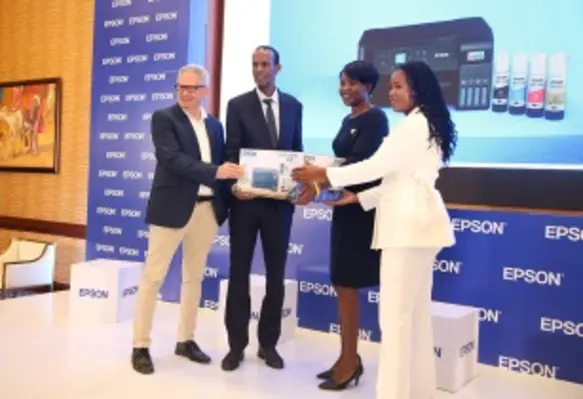Global technology leader Epson has launched a school donation programme that will see 80 schools in the country receive printers, projectors and visualisers as part of an initiative to enrich education through technology
This programme is part of an initiative by Epson to give over 800 EcoTank printers and hundreds of bundles of interactive classroom kits to schools and hospitals across eight countries in the Middle East and Africa region [MEA].
Epson has partnered with Liquid Intelligent Technologies, who will provide last mile support that will see schools receive equipment estimated at a cost KES 4.9 million (US$30,187)
Liquid is already working on a programme with UNICEF to connect schools to the internet across the country.
Speaking during the launch of this programme, Education cabinet secretary (CS) Ezekiel Machogu, lauded the initiative, which he noted will go a long way in supporting the implementation of Competency Based Curriculum (CBC), which requires students to be involved in many practical applications which include printing.
“I further appreciate the role that this technology, in the form of printers, projectors and visualisers, will play in aiding teaching and learning, especially in classes with big numbers of students in underprivileged communities,” noted CS Machogu.
“This initiative and the role technology plays in making educational materials more accessible to all, have an enormous impact. Epson is dedicated to nurturing future talent and ensuring that quality education reaches children, regardless of their geographical or socio-economic background. The EcoTank printers, in addition to being energy-efficient, the EcoTanks come with enough ink to last up to three years. This not only makes them a long-lasting, sustainable solution for schools,” stated Epson’s regional head for East and West Africa, Mukesh Bector.
Liquid Intelligent Technologies’ group chief technology and innovation officer Ben Roberts noted that this partnership represents a significant step in enhancing educational opportunities through technology.
“Through this collaboration, the schools are benefiting from the connectivity provided by Liquid, and the additional ICT tools such as printers, projectors and visualisers, are enhancing the impact of the near infinite access to information and resources that being connected delivers. Our last mile distribution of internet, connecting communities of ICT teachers, will complement our partnership with Epson in the last mile distribution and support of printers”, commented Roberts.
Commenting on the collaboration, Adil El Youssefi, CEO of Liquid Intelligent Technologies: Rest of Africa, stated, “This partnership exemplifies our commitment to supporting schools and communities, making education more accessible, and empowering the youth of Kenya with the skills they need for a brighter future”. He added, “At Liquid, we work extensively to provide digital skills and roll out educational programs to reiterate our support towards the Government’s focus on increasing ICT and education access in the country. This initiative also aligns with our vision of a digitally connected Africa in which no one is left behind.”
“My teaching philosophy is deeply rooted in fostering innovation and nurturing the growth of capacities. I am driven by a profound passion for promoting gender equality and I am committed to dismantling obstacles that hinder the progress of young students. Despite the ongoing challenges in integrating educational technology into classrooms, such as financial limitations and the complexities of acquiring, installing, and utilising effective tools, my dedication remains unwavering. I believe in empowering young minds through education, transcending the hurdles that persist in the realm of educational technology”, stated Bosibori.
Globally Epson has transitioned its technology from laser to inkjet technology, thereby reducing energy and ink costs for users, laser technology requires heat to fuse toner to a page whereas inkjet is a cold technology, needing less energy to operate. With a compact footprint and lightweight design, the products help limit resources used during production and shipping. High yield ink cartridges also reduce material usage, shipping, storage and end of use management of consumables, as well as reducing downtime for routine maintenance.






















